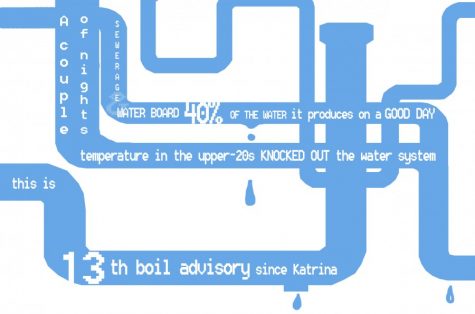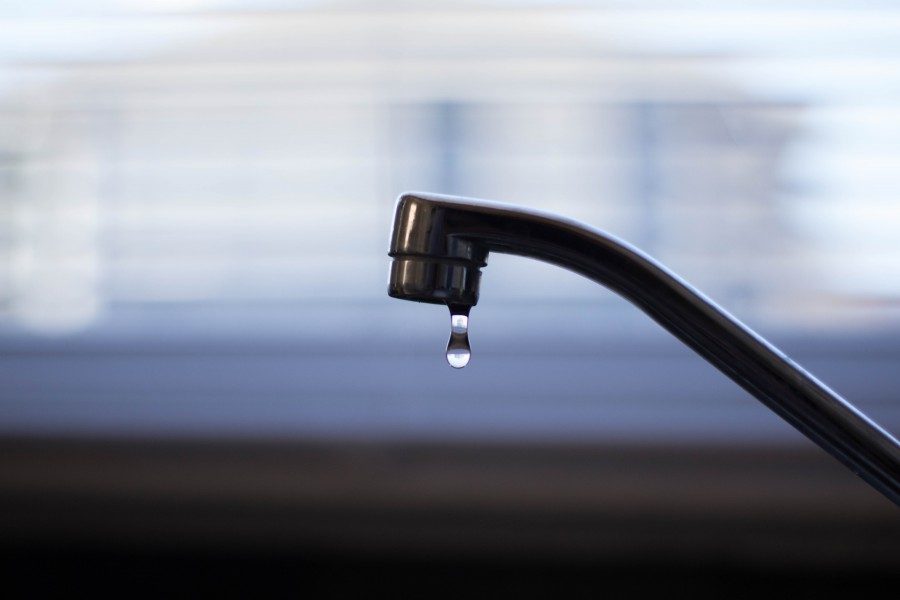Water advisories reflect broken New Orleans infrastructure
When temperatures dropped below 20 degrees on Jan. 18, the city of New Orleans experienced its 13th boiled water advisory since Hurricane Katrina.
Tulane students found themselves relying on their dormitory service desks for drinking water and some off-campus houses were left without water for days.
Water advisories most notably affect drinking water but also have a chain reaction that affects much more.
“Our water wouldn’t turn on,” junior Carly Breans said. “… Our house has a downstairs, and they had water so we were able to shower there. The people next door didn’t have water, so they showered at Reily. It lasted a day and a half but then took another day to get hot water.”
On a larger scale, during the advisory Louis Armstrong Airport was forced to set up portable toilets and stop most of its food services. The heat went out, as not enough water was available to keep the boilers running.
Terminal bathrooms have been closed at the Louis Armstrong International Airport after broken water lines… https://t.co/j2ztwfvWcj
— ReportersLab (@TheReportersLab) January 18, 2018
According to Mark Davis, senior research fellow, director of the Institute on Water Resources Law and Policy and director of the Tulane University ByWater Institute, boil water advisories stem from a variety of causes. The most recent one was caused in part by the low temperatures experienced across the city.
When the hard freeze occurred, the Sewage and Water Board of New Orleans advised those worried about frozen pipes to run a thin stream of water from faucets.
“It just needs to be thin like a pencil lead but if everyone in town is doing that, then the demand on the system is huge and the overall pressure in the system can drop,” Davis said.
This drop in pressure easily causes cracks to pipes that are already in poor shape. When these cracks occur, ground water surrounding the pipes seeps in along with contaminates.
More commonly, the advisories are due to power outages occurring at water pumping stations on the East or West Bank. The outage hinders the pipes from maintaining constant pressure.
The boil water advisory has been lifted for the East Bank, but remains in place for our people in New Orleans East. We are urging residents to continue conserving waters so that the water pressure will return to everyday levels. Follow @nolaready for continued updates.
— LaToya Cantrell (@LaToyaForNOLA) January 20, 2018
“The other problem is that when you have low pressure and this infiltration of contaminates, you can lose water through those cracks that sometimes by the time you get far away from the main plant, then there may not be much chlorine or anything left in the water,” Davis said.
Students like senior Karen Liao see the immediate consequences of a weak water system as an inconvenience but may be less aware of the larger issues at stake.
“I think the water boil advisory guidelines are rather extreme and mainly for preventative purposes,” Liao said. “Usually I still use the water to brush my teeth and have even accidentally drank it before I saw the warning. I’ve never gotten sick or known anyone that has.”
Some residents said they believe the water boil advisories are merely a symptom of a more serious issue at hand: the failing infrastructure of New Orleans. This is in part because many of the pipes across New Orleans are old and poorly maintained.
“We have an old, tired system that hasn’t had the kind of deferred maintenance that a system requires,” Mayor Mitch Landrieu said in a Nola.com article. “It breaks.”
Some students are distrustful of the city’s water supply in any case.
“I don’t drink from the tap regardless of the water boil advisory,” freshman Camille Couvillion said.
On a good day, The Sewerage & Water Board of New Orleans loses 40 percent of the water it produces. Additionally, the Board has had a poor track record of dealing with emergencies.
 Anh Nguyen | Design Associate
Anh Nguyen | Design Associate
In August, when a heavy rainstorm flooded parts of the city, the Sewerage & Water Board claimed to be working at full capacity when in actuality three of five power turbines and 17 drainage pumps were not working during the storm, and pumping stations were not fully staffed.
“Our biggest problem is that a lot of the things are either no one’s job or we have chosen to underfund and under account,” Davis said.
The insurance and financial industries are starting to look at water as a significant risk factor when deciding where to start and maintain business. Similarly, homeowners in the city are being forced to make water management a priority.
“If you want a home that’s comfortable to live in that you could sell to the next person who wants to buy, if you want to make sure in the future a bank will be happy to give you a loan in a favorable rate, you’re probably going to have to start thinking about this,” Davis said.
Despite the city’s difficulty with separating politics and infrastructure, there are signs of a turning tide. Recently, the state of Louisiana funded the Urban Water Plan, which focuses on how to deal with the direct water issues that challenge New Orleans. Mayor-elect Latoya Cantrell has designated a committee to develop a citywide water management plan.
“The boiled water advisories are a huge hassle, and I think everyone questions the sanitation of Tulane water at some point,” Breans said.
The issue of clean water in the city of New Orleans is existential according to Davis, meaning it is just as pressing for Tulane.
“I mean every time there is a boil water advisory, there are families, students, potential faculty and staff who are going to make a decision – ‘Is this a place I want to be?'” Davis said.
Many students said they think Tulane holds a responsibility to serve its community in preparedness and prevention, but some also believe it should be a leader in the cause.
“We’ve got all of these things that quite frankly the rest of the city can learn from, and we have an obligation to help lead with,” Davis said.
The responsibility lies not only at a university level but also at the level of individual students. Davis urges students to educate themselves and to take steps toward making them less vulnerable in the high-risk environment of New Orleans.
“Even if you’re only here for a little while, make this your home, get involved,” Davis said.
Leave a Comment
Your donation will support the student journalists of Tulane University. Your contribution will allow us to purchase equipment and cover our annual website hosting costs.

















Richard N • Feb 3, 2018 at 9:42 pm
Frozen pipes are a thing of the past in our house. We use a ReadyTemp optimizer that intermittently circulates warm water throughout our hot and cold water lines.